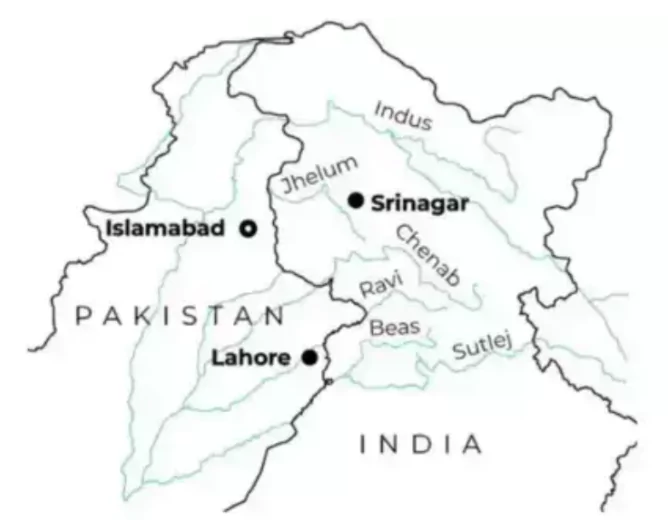India has sent a formal notice to Pakistan requesting changes to the Indus Water Treaty.
More on the news
- The notice mentions that there have been fundamental changes in circumstances that need a review of the treaty.
- In January 2023, India had also sent a similar notice to Pakistan asking for amendments to the treaty.
Enroll now for UPSC Online Course
About Indus Water Treaty

- The Indus Water Treaty (IWT) is a water-sharing agreement between India and Pakistan.
- It was arranged by the World Bank.
- It was signed in 1960 in Karachi between Jawaharlal Nehru and Ayub Khan.
- The treaty regulates the use of the Indus River and its tributaries between the two countries.
-
Key Provisions of Indus Water Treaty
-
- The treaty ensures fair water usage by both countries and sets guidelines for building projects over the rivers.
- Focuses on cooperation and goodwill between the nations for optimum water use.
- It has established the Permanent Indus Commission to resolve disputes.
- The treaty has survived several wars and provided a mechanism for conflict resolution.
- Permanent Indus Commission
- It involves commissioners from both countries to oversee cooperation and dispute resolution.
- The commission has survived three wars and ensures annual inspections, data exchanges, and meetings.
- Both commissioners submit an annual report.
- Although these reports are not made public.
History and Background
- The Indus Water Treaty resolved water disputes that arose after the 1947-1948 Indo-Pakistani War.
- Since the treaty was signed in 1960, there have been no water-related wars between the two nations.
- Disagreements are mostly settled through legal procedures defined in the treaty.
|
Distribution of Rivers and Water
- Eastern Rivers (Beas, Ravi, Sutlej): India controls these rivers with a total flow of 41 billion m³ annually.
- India gets most of the water from eastern rivers (80%).
- Western Rivers (Indus, Chenab, Jhelum): Pakistan controls these rivers with a total flow of 99 billion m³ annually.
- Pakistan gets most of the water from western rivers (80%).
- India can use the Western Rivers for limited irrigation and non-consumptive purposes like power generation and navigation.
Check Out UPSC CSE Books From PW Store
Kishanganga Project
- It is a run-off river project in Jammu and Kashmir.
- Installed capacity of the project: 330 MW.
- It diverts water from the Kishanganga River to theJhelum River basin.
- Project Starting Date: 2007
- This project was halted in 2011 due to disputes with Pakistan.
- Pakistan stance: Pakistan raised concern about the project efforts on water flow to downstream areas in Pakistan-administered Kashmir.
- The Hague’s Permanent Court of Arbitration (CoA) : In 2013, Court allowed India to divert water with certain conditions.
|
Issues and Concerns
- Ratle Plant Dispute: Pakistan objects to India’s 850 MW Ratle Hydroelectric Plant and seeks arbitration to resolve the issue.
- Disputes like Baglihar Power Plant and Kishanganga Plant were resolved through the Permanent Court of Arbitration (PCA) or neutral experts.
- Groundwater Use: Pakistan uses groundwater from eastern rivers ( Ravi and Sutlej) but India does not raise formal objections.
- However, It is a potential treaty violation by Pakistan
- India’s attempts to use water or build dams often face objections from Pakistan.
- The Tulbul Navigation Project is an example of such a dispute.
- Flooding in Kutch: Pakistan’s river works cause flooding in India’s Great Rann of Kutch, violating the treaty.
Enroll now for UPSC Online Classes
![]() 19 Sep 2024
19 Sep 2024
